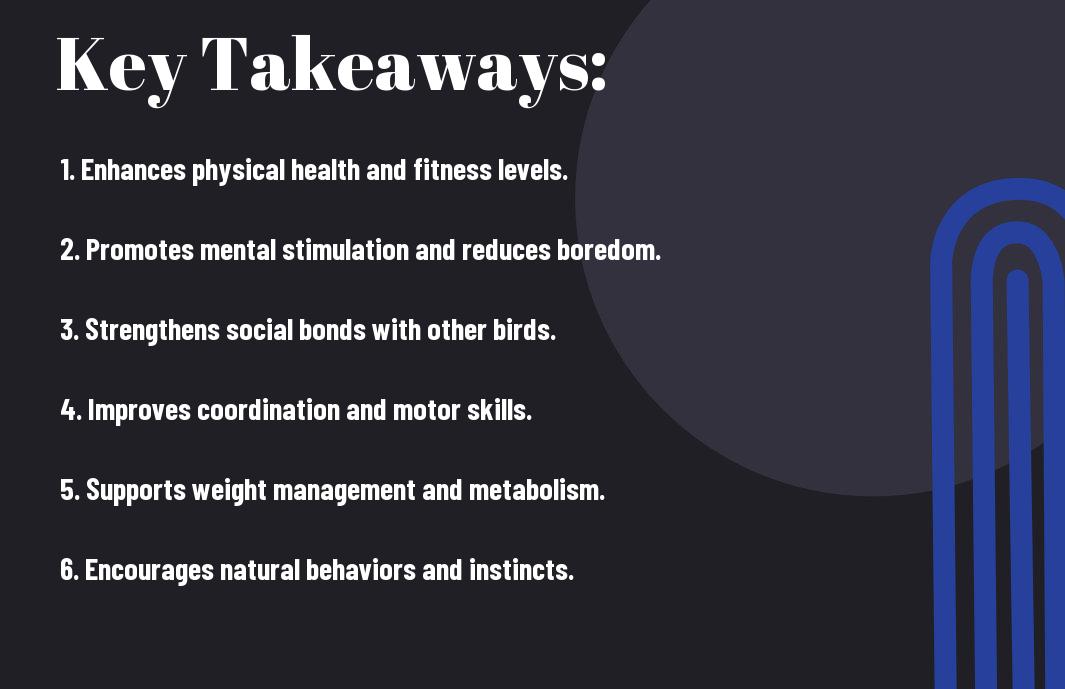Many bird owners often overlook the importance of regular exercise for their feathered companions. Just like humans, birds require physical activity to maintain their health, prevent obesity, and stimulate their mental well-being. Without proper exercise, you risk your bird developing serious conditions such as heart disease or depression. By incorporating daily playtime and flight opportunities, you can ensure your bird remains active, happy, and healthy, improving not only their quality of life but also strengthening the bond you share.

Physical Health Benefits
As a bird owner, you may already be aware of the many ways regular exercise can benefit your feathered friends. Incorporating daily physical activity into their routine can lead to significant improvements in overall health. When your bird engages in exercise, it can promote vital biological functions, boost their physical resilience, and contribute to their happiness.
Improved Cardiovascular Function
With regular exercise, your bird can experience improved cardiovascular function. Just like in humans, cardiovascular health is critical in birds for maintaining optimal body function and promoting a strong heart. Activities that elevate the heart rate help improve blood circulation, ensuring that oxygen and nutrients are efficiently delivered to vital organs.
An active bird is less likely to suffer from conditions such as heart disease, which can largely stem from inactivity or poor diet. Ensuring your bird engages in aerobic activities—like flying or climbing—will not only enhance its cardiovascular system but also improve its respiratory functions, contributing to overall vitality and longevity.
Enhanced Muscular Strength
Physical activity is vital for your bird’s muscular strength. By encouraging your pet to fly, climb, or play, you give it the opportunity to develop strong muscles, which are crucial for overall mobility and stability. Strong muscles help your bird maintain balance and coordination, which is particularly important as they age.
Health and muscle function are closely linked; a bird with enhanced muscular strength will find it easier to navigate its environment, evade potential threats, and perform daily activities with ease. Additionally, improved muscular strength contributes to greater endurance, meaning your bird can engage in longer play sessions without fatigue.
Weight Management
Physical activity plays a significant role in your bird’s weight management. Just like humans, birds can struggle with obesity if they lead a sedentary lifestyle. Regular exercise helps maintain a healthy weight by burning calories and preventing excessive fat accumulation. When your bird exercises, it not only sheds excess weight but also builds lean muscle mass, which is vital for overall health.
Another crucial factor in weight management is that it reduces the risk of developing metabolic disorders common in overweight birds. Maintaining an ideal weight through exercise ensures that your pet enjoys a life free from potential complications, allowing it to be active and joyful for years to come.

Behavioral Advantages
The behavioral advantages of regular exercise for birds extend beyond just physical health; they significantly enhance your feathered friend’s overall well-being. By engaging in consistent physical activity, you promote a positive mindset in your bird, making them more adaptable to environmental changes and less prone to destructive behaviors. This translates into a more content and interactive pet that thrives in your care, improving both their quality of life and the harmony of your household.
Reduced Stress and Anxiety
On a fundamental level, routine exercise plays a vital role in alleviating stress and anxiety in birds. When your feathered companion is given opportunities to fly, climb, or play, it redirects their energy into positive behaviors. As a result, you will likely notice that your bird becomes less fearful and more confident, which corresponds to a reduced need for harmful behaviors, such as feather plucking or incessant vocalizations.
Furthermore, access to physical activity has been linked to the release of endorphins, which are natural mood lifters. On a daily basis, by incorporating playtime and exercise into your bird’s routine, you create an environment where they can experience less anxiety and achieve emotional stability. This is particularly important if your bird tends to be skittish in unfamiliar situations or has trouble adjusting to new environments.
Increased Social Interaction
Anxiety can often stem from a lack of social stimulation. By encouraging regular exercise, you create opportunities for increased social interaction not only with you but also with other pets. Birds are naturally social creatures, and engaging them in play can foster a bond that enhances their emotional well-being. You will find that your bird will become more sociable, wanting to explore their surroundings and engage with both you and potential companions.
Stress can lead to a decline in your bird’s social engagement. When you provide your feathered friend with a variety of stimulating activities, such as games or obstacle courses, they become more eager to interact. Your involvement during these sessions allows you to form a stronger connection with your bird, making them feel more secure and loved. This not only benefits their social skills but also strengthens the bond you share, ensuring a happier life for both of you.

Cognitive Enhancements
Despite the common perception that exercise is primarily a physical endeavor, it also significantly contributes to your bird’s cognitive well-being. Engaging your feathered friend in regular exercise isn’t just about keeping them fit; it plays a crucial role in enhancing their mental capabilities. By incorporating various activities into your bird’s routine, you can help them develop better cognitive functions that can ultimately lead to a happier and more enriched life.
Improved Learning and Memory
One of the foremost benefits of regular exercise for your bird is the enhancement of their learning and memory. When birds engage in physical activities, they stimulate their brains, which can lead to improved neural connections. This increased brain activity facilitates faster learning and better memory retention. For example, you may notice that your bird can master new tricks, songs, or commands more quickly after consistent exercise routines.
This cognitive boost can also translate into better social interactions. An active bird with a sharp mind is more likely to interact positively with you and other pets. They will be adept at recalling names, sounds, and even routines, enriching their social experiences and helping them bond more closely with their human caregivers.
Greater Problem-Solving Skills
Improved cognitive functions through regular exercise also lead to greater problem-solving skills in your bird. As your feathered companion engages in various physical challenges, their brains work to assess situations and find solutions. Consequently, these activities can cultivate a sharper, more analytical mind that can tackle new challenges with confidence and adaptability.
Memory and cognitive function improvements become evident as your bird learns to navigate complex puzzles, try different manipulation techniques for toys, or even discover novel ways to interact with their environment. These enhanced problem-solving skills not only stimulate your bird’s brain but also provide them with a fulfilling outlet for their natural curiosity. Overall, investing time in your bird’s exercise regimen will yield invaluable rewards for both their physical and mental health.
Long-Term Wellbeing
Now, as a bird owner or enthusiast, understanding the long-term benefits of regular exercise for your feathered friends is critical for their health and happiness. Regular physical activity not only helps to maintain physical fitness but also promotes overall wellbeing in various aspects of your bird’s life. It is imperative to incorporate exercise into your bird’s daily routine to ensure they lead a fulfilling and enriched life.
Increased Lifespan
Long-term benefits of regular exercise can dramatically increase your bird’s lifespan. Just like with humans and other animals, exercise helps to maintain a healthy weight, reduce the risk of heart disease, and keep the immune system robust. By engaging your bird in activities that mimic natural behaviors—like flying, climbing, and foraging—you can significantly contribute to their physical health. An active bird is less likely to become overweight or develop obesity-related conditions, therefore enhancing longevity.
Moreover, regular exercise contributes to maintaining your bird’s mental health. Birds that engage in regular physical activity tend to show fewer signs of stress, boredom, and destructive behavior. Specifically, mental stimulation coupled with physical exertion elevates your bird’s mood, leading to a more full-filled and happier life, which is vital for their overall wellbeing. This harmony between physical and mental health can lead to a significantly longer lifespan.
Better Adaptation to Environmental Changes
Wellbeing in birds also extends to their ability to adapt to environmental changes over time. Regular exercise develops and strengthens their muscle tone, coordination, and agility, which enhances their capability to respond to unforeseen situations or disturbances in their environment. An active bird is more likely to navigate challenges with ease, thus improving its chances of survival.
It is imperative to note that a physically fit bird can quickly adjust to new living conditions, whether it be a change in habitat or different social dynamics. Regular exercise not only fosters physiological readiness but also promotes confidence, making your bird more capable of coping with stressful situations. Additionally, birds that exercise regularly develop better cognitive abilities, leading to improved problem-solving skills when faced with challenges. This adaptability is invaluable, as it ensures that your beloved pet can thrive, regardless of any changes in its surroundings.
FAQ
Q: What are the primary benefits of regular exercise for pet birds?
A: Regular exercise is imperative for pet birds as it promotes physical health, mental stimulation, and social interaction. Physically, exercise helps maintain a healthy weight, improve cardiovascular health, and strengthen bones and muscles. Mentally, it reduces boredom and stress, preventing behavioral issues such as feather plucking or aggression. Additionally, social interaction during exercise can strengthen the bond between the bird and its owner, enhancing the overall wellbeing of the pet.
Q: How can I provide adequate exercise opportunities for my bird at home?
A: Providing adequate exercise for your bird can be achieved through various activities. You can set up a designated play area with toys, perches, and climbing structures that encourage movement. Regularly interacting with your bird through free flight in a safe environment or engaging in activities such as fetch or hide-and-seek can also offer valuable exercise. Additionally, offering foraging opportunities can stimulate their natural behaviors and promote activity as they search for hidden treats.
Q: How much exercise do different types of birds need?
A: The exercise needs of birds can vary significantly depending on their species and size. Smaller birds, such as budgerigars and canaries, require at least 1-2 hours of active out-of-cage time each day. Larger birds, like parrots, typically need even more, often 3-5 hours daily, due to their higher energy levels. It’s important to consider the individual needs of your bird, as factors such as age, health, and activity level also influence their exercise requirements. Observing your bird’s behavior can help you tailor an appropriate exercise routine for them.











